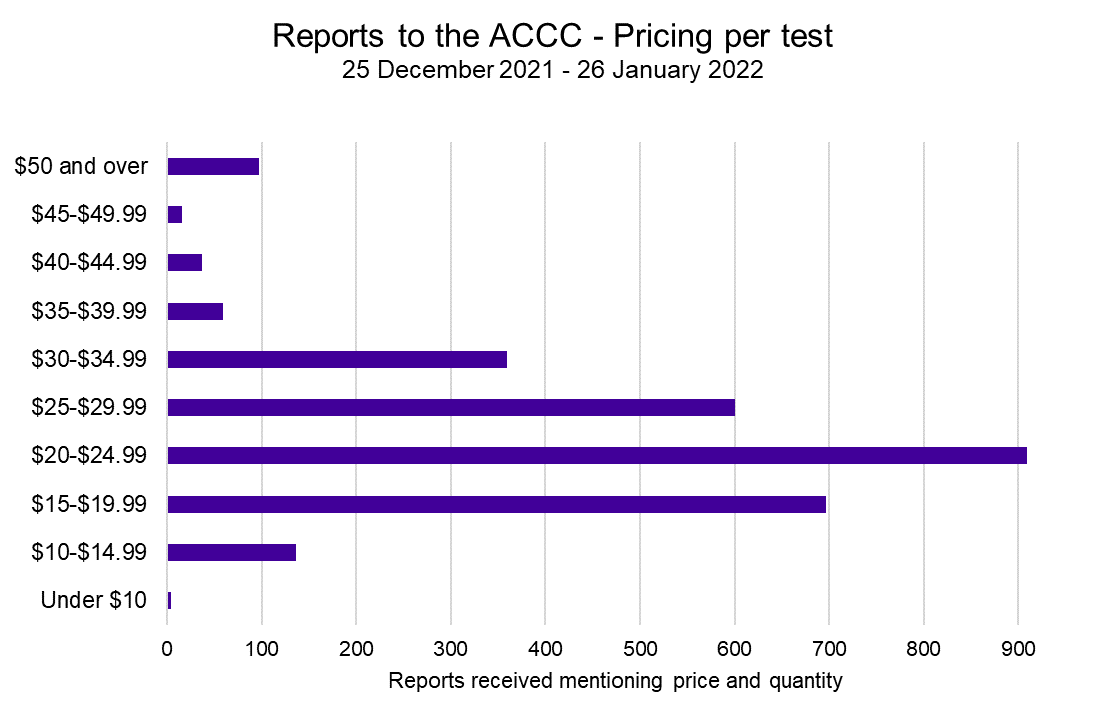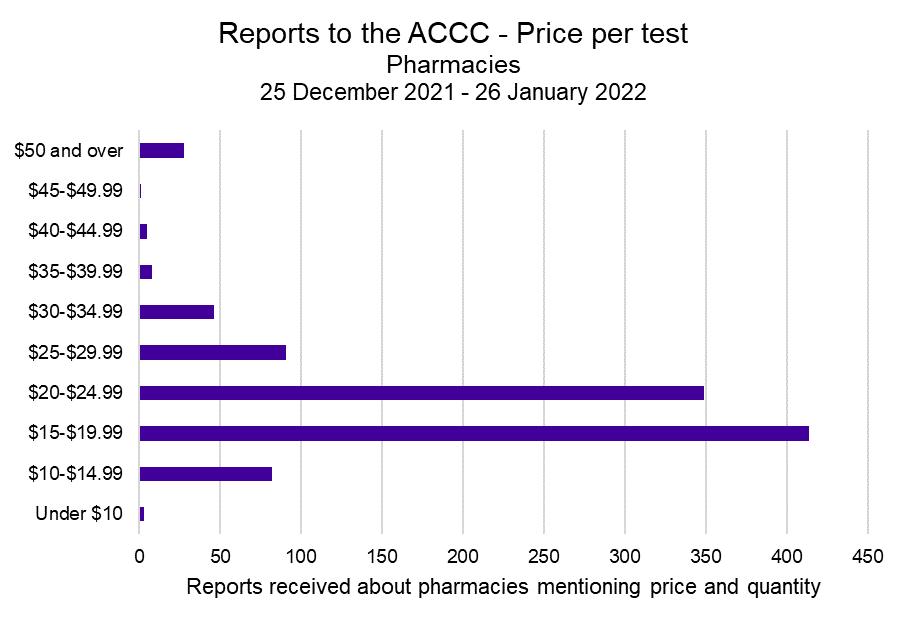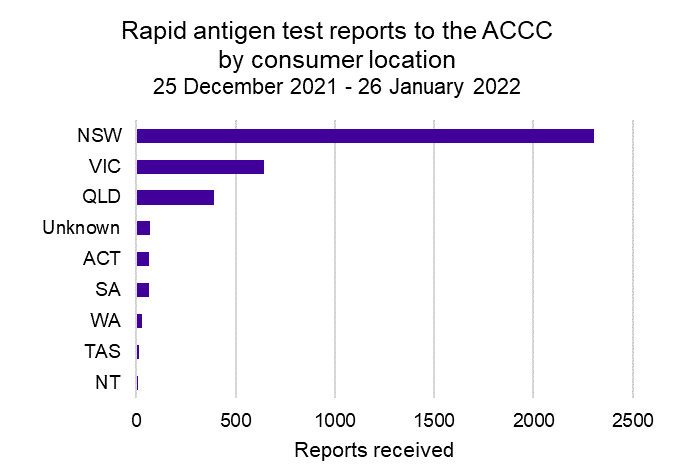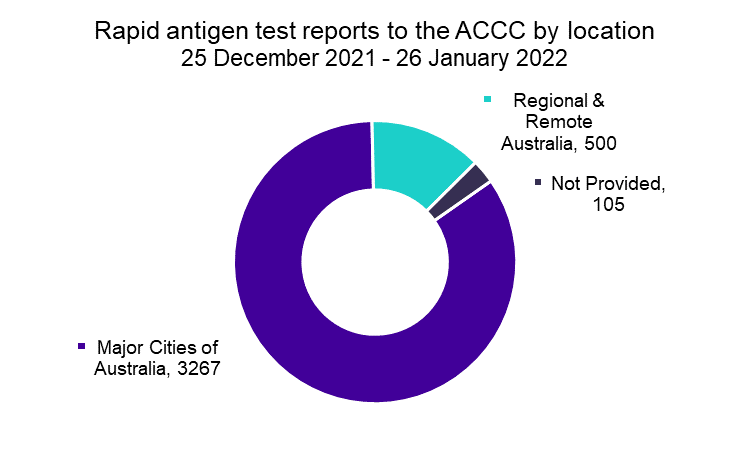The ACCC is continuing to receive a high number of consumer reports about pricing and selling practices relating to rapid antigen tests in Australia and is investigating several potential Australian Consumer Law breaches.
The ACCC has received almost 3,900 reports from consumers about rapid antigen tests between 25 December 2021 and 26 January 2022, averaging about 121 reports per day. Pharmacies have been the most-complained about sector, attracting 1,309 complaints, or almost 34 per cent of reports, outstripping petrol stations (781 complaints, 20 per cent of reports) and convenience stores, tobacconists and supermarkets (764 complaints, almost 20 per cent).
Since mid-January, however, pharmacy complaints were less than 25 per cent of total reports, as many more complaints were received from smaller stores which would not usually sell such items.
More than 50 test suppliers, major retailers and pharmacy chains have now been asked by the ACCC to explain their costs, current pricing, and stock availability, and warned that they must be able to substantiate any claims made to consumers about the reasons for higher prices.
Importantly, the ACCC has also made further referrals to both the Australian Federal Police and the Therapeutic Goods Administration (TGA) following tip-offs by consumers about alleged illegal re-selling of rapid antigen tests and alleged package splitting and sale of tests not approved for home use in Australia.
In addition, an investigation has commenced into claims by some suppliers that government entities may have diverted or sought priority supply of rapid antigen tests.
“Community concerns about sales practices for rapid antigen tests remain very high, for good reason. We thank the consumers who have taken the time to pass on to us crucial information about what is happening in this market. These reports, and the public scrutiny, are helping to keep prices at lower levels than otherwise,” ACCC Chair Rod Sims said.
“Businesses now know we will be in touch very quickly if they choose to impose unjustifiably high mark-ups on rapid antigen tests, or make misleading statements to consumers. In view of the public interest in this issue, we will continue to name business chains whose stores are reported to have engaged in this conduct, and are working very closely with our fellow law enforcement agencies in this area, particularly in relation to individual stores.”
ACCC pricing analysis
Almost 95 per cent of consumer reports received by the ACCC since 25 December 2021 were about the price of rapid antigen tests. Many of these reports also raised other concerns about the sale of the tests, including package splitting, which is illegal and where the TGA has jurisdiction.
Analysis of reports to the ACCC indicates many consumers are still paying between $20-30 per test (though it’s worth noting that consumers are unlikely to report more reasonable prices to the ACCC). Based on these reports to the ACCC the average price of a test appears to have remained broadly steady since 12 January at about $24.


Updated information from intermediate suppliers, manufacturers and importers indicates that wholesale prices remain between $3.82 and $11.42 per test, depending on the type of test. The ACCC’s data on wholesale prices is based on information requests issued by the ACCC covering the period between 29 December 2021 and 14 January 2022. There have been some recent reports of higher wholesale prices which we are seeking to verify.
“While $20 retail prices remain lower than the more extreme reports received by the ACCC, this is still an unusually high mark-up that in our view is very difficult to justify,” Mr Sims said.
The average price of tests in pharmacies based on consumer tip-offs has recently been closer to $21. Most pharmacies appear to be charging between $15 and $25, however there are outliers with much higher prices.
“We are looking at reports of single tests being sold for $30 or more from certain stores. For example, we have received many reports of high prices at a number of individual IGA Supermarkets and BP-branded petrol stations (133 and 72 complaints respectively, to 26 January 2022). However, I want to emphasise these complaints are limited to a small number of individual stores in these chains and that the majority of stores in those chains have not been the subject of complaints to us. We have contacted those chains, and will be engaging with the stores named in complaints to ask them to explain their prices so we can work out what’s going on,” Mr Sims said.
Importantly, the ACCC has received significantly fewer complaints about excessive pricing involving certain businesses after previously raising concerns, including individual retailers operating under the King of the Pack and Metro Petroleum brands.


Investigation into alleged diversion of supplies by government bodies
The ACCC is investigating representations by a number of suppliers that government entities may have diverted or sought priority supply of rapid antigen tests from suppliers who had existing contracts in place.
Some suppliers have made these claims in emails or on their websites. The Federal Government has given clear and repeated advice that it has not commandeered or asked for priority supply.
“ACCC investigators are speaking with the suppliers involved and will look to address any misrepresentations identified,” Mr Sims said.
“The ACCC takes this opportunity to remind suppliers about the importance of honouring any contractual arrangements for supply, and of being honest about the reason why rapid antigen tests may currently be unavailable. Suppliers must be able to substantiate any claims they make about test availability, and we are asking them to do so.”
Information provided to the ACCC suggests that, following strong demand for these products, suppliers at various levels in the distribution chain are making decisions about which customers to supply. While significant volumes of orders have been placed, supply chain issues mean that many orders are still yet to be delivered to retailers.
While the ACCC is at the initial stages of its inquiries, one claim has since been publicly retracted by the supplier that initially made that representation.
Most consumer complaints are from NSW
Over two-thirds of consumer reports to the ACCC about rapid antigen test pricing were about traders in NSW. While this is a significantly higher proportion of complaints than may be expected from its population, it may also reflect that the Omicron ‘wave’ was initially concentrated in NSW more than other states, particularly in late December 2021 and early January 2022.

Almost 85 per cent of reports to the ACCC were about traders located in major Australian cities, with over 10 per cent of complaints being about traders in regional or remote Australia. The lower reporting pattern may reflect supply levels in those locations.

Emerging trends in consumer reports
Recent consumer reports to the ACCC have revealed a number of emerging issues of concern.
- Pricing: The ACCC understands that some retailers may be under the impression that they are “allowed” to sell tests at a high price if they were purchased from a wholesaler. This is incorrect. Charging excessive prices for rapid antigen tests, whether they were initially supplied by a wholesale or another retailer, may be considered to be unconscionable conduct in certain circumstances – particularly given we are in the middle of a pandemic. Unconscionable conduct is prohibited by the ACL and can result in very large penalties being imposed by the Court. Retailers should be aware that they risk breaching the ACL if they charge exorbitant or excessive prices for rapid antigen tests.
- False and misleading claims: The ACCC continues to receive reports of consumers being given misleading information about the reason for supply challenges. Reports of potential scams and online stores wrongly accepting payment also continue, when the online businesses stores knew, or should have known, that they would not be able to supply the tests in a timely manner.
- Refusal to provide receipts: The ACCC continues to receive reports of businesses failing to provide receipts or providing incorrect receipts. Refusal to provide receipts when requested or for total purchases of $75 or more (excluding GST) is a breach of the ACL, and penalties may be imposed by the Court. The ACCC is contacting these businesses about these concerns.
- Package splitting: Reports to the ACCC continue to indicate the widespread practice of packs being split and sold in individual lots, sometimes without instructions for their use. We are also aware of reports of tests approved for clinical or professional use being sold directly to consumers. These reports will continue being referred to the TGA as required.
ACCC is working with other regulators
The ACCC is continuing to work closely with other regulators to address public concerns about rapid antigen tests, and has recently referred a number of matters to the following agencies for consideration and potential investigation:
- Australian Federal Police (AFP) – regarding matters that may be a breach of the Government’s 8 January 2022 determination under the Biosecurity Act, which will remain in place until 17 February 2022. The determination prohibits a person from reselling, or offering to resell, rapid antigen tests bought at retail level for mark-ups above 20 per cent. More information about the AFP’s response to rapid antigen test pricing can be found in the AFP’s dated 21 January 2022.







